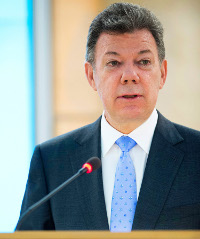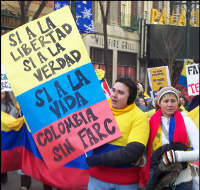
How might the FARC peace negotiations impact Colombia’s presidential election?
President Barack Obama emphasized “the tremendous progress that’s taken place in Colombia” after meeting with President Juan Manuel Santos at the White House on December 3. His comments come at a pivotal moment as Colombia enters an electoral season.
“I’m doing it [running for re-election] because when you see a light at the end of the tunnel, you don’t turn back”
—President Santos on his commitment to peace talks when announcing his candidacy. November 20, 2013
The Colombian government is in the midst of negotiating an historic peace agreement with the Fuerzas Armadas Revolucionarias de Colombia (FARC), and President Juan Manuel Santos is committed to continuing the negotiations throughout his re-election campaign. Just over one year after negotiations were formally launched in October 2012, negotiators reached an agreement last month on the issue of political participation—the second point of the six-point agenda. While Colombia’s security situation has vastly improved, ending the war with the FARC is of political importance. It would put to rest Latin America’s longest running conflict and it would stem the flow of illicit drugs from Colombia.
The May 2014 presidential election now partially rests on the negotiations taking place in Havana, polarizing the country and defining the candidates. Other issues such as jobs and a growing anti-political establishment sentiment may be important but peace negotiations will play a pivotal role.
The president has taken considerable risk in continuing the negotiations throughout his election.How might the FARC peace negotiations impact Colombia’s presidential election?Three factors to consider: |
1. Support for the President will depend on the status of negotiations over the next few months.
Scenario A. Negotiations stall with no new agreement on additional points.
In choosing to continue negotiations throughout the campaign, President Santos has made a bold move for a lasting peace but also made the FARC talks the wedge issue of this election. In doing so, he has deepened the rift between himself and former President Álvaro Uribe who strenuously opposes engaging with the FARC. President Santos is betting that most Colombians will side with him that peace is worth the effort. But with four points left on the agenda, he will need to prove that the Colombian government can leverage its power and attain concessions on some of the most difficult issues. This puts the FARC in a uniquely powerful position as their level of
| “Santos has made […] the FARC talks the wedge issue of this election.” |
cooperation will dictate how much progress can be made. If past behavior is any indication, the FARC is likely to squander this opportunity for progress and stall forward movement while blaming the government. It took six months to agree on the second agenda point; if the same timeline holds for the next point, the President may be looking at a difficult road to victory.
Scenario B. Negotiations show signs of progress but no final accord is reached.
The FARC is just as invested in the process as is the government. The terms of these negotiations have always been that unless all agenda items are agreed upon, there is no agreement. Without progress, and if President Santos loses the election because of this, the next president is unlikely to continue negotiations. Thus, there is pressure on both sides. This is why they changed the order of the negotiations to now discuss illicit drugs (originally the fourth point); it is seen as an easier issue than disarmament. Progress on this topic or any of the four remaining points of the agenda will be beneficial to President Santos’ image as a peacemaker and a leader. This will provide a significant boost against the naysayers and could become a significant driver for his re-election.
Scenario C. Referendum is brought to a vote.
Even with agreement on all six points—an unlikely scenario prior to the May presidential election—it is still unclear how the terms of the negotiations would be ratified. The FARC wants to create a constitutional assembly to rewrite the constitution. President Santos has instead suggested that the agreement—provided all points are finalized—be voted on in a referendum, making an implicit promise that nothing will happen without the consent of the people. Before doing so, the government would need to launch a public education campaign on the terms of the agreement. Assuaging public concern, especially around FARC reintegration into society, would take some time and makes a referendum vote accompanying the March legislative elections or the May presidential election improbable. Still, an agreement on all six points followed by a national referendum would generate widespread sympathy for President Santos and solidify his image as a strong leader and decision-maker.
“I congratulated President Santos on his bold and brave efforts to bring about a lasting and just peace inside of Colombia in his negotiations with the FARC.”
—President Obama from the White House, December 3, 2013
2. The President wants to use the negotiations as a wedge issue. He is succeeding today. But there may be other candidates in the wings that could influence the swing vote.
In making negotiations with the FARC his wedge issue President Santos has created a dichotomy within the Colombian political system: either you’re for peace, or you’re against it. The Uribe-supported presidential candidate, Óscar Zuluaga of Centro Democrático, is an outspoken opponent of negotiating with the FARC, but most Colombians favor finding a peaceful solution. Still, much hesitation hovers around the potential for impunity for FARC crimes. Colombians want an end to the violence, but not without holding the perpetrators responsible. President Santos has assuaged these concerns by proposing the referendum, thereby ensuring that voters will have the
| “Opinion polls show an overwhelming percentage of Colombians remain undecided.” |
final say. If Centro Democrático wins a significant number of Senate seats in the March elections, President Santos, if he wins re-election would face a stronger opposition in getting legislation passed in Congress.
Yet the election is still at a volatile moment. Polarizing between peace and no peace works well if the only other important candidate is Zuluaga. Opinion polls show an overwhelming percentage of Colombians remain undecided in the election. A November 2013 poll conducted by Datexco reports only 60 percent of people backed a declared candidate. Many Colombians remain undecided, but affirmation of the negotiations by President Obama on December 3 will carry significant weight in convincing those skeptical in Colombia.
Rumors are swirling that former Bogotá Mayor Enrique Peñalosa, former presidential candidate and freed FARC captive Ingrid Betancourt, or former M-19 guerilla leader Antonio Navarro may enter the fray as the candidate of a loose coalition of center-left parties. With so many votes up for grabs, these candidates could change the face of the race. With a serious third candidate, the race ceases to be one that divides the country between those who are for and those who are against peace; the emergence of additional serious contenders could dramatically alter the campaign for all candidates.
3. The FARC launch new attacks ahead of the election and upends the President’s calculations.
For half a century the FARC has waged a brutal campaign of violence and terror, with 220,000 people killed in the nearly 50-year war with the country’s guerrilla groups. It is not unreasonable to fear a return of violence. In February 2012, however, the group agreed to end its infamous kidnappings and release prisoners held at the time. Since then, the organization has undertaken a series of steps to increase its legitimacy. Still, in August 2013, the FARC killed 13 Colombian soldiers in an ambush ahead of further talks. Fresh acts of violence would guarantee a significant delay in the negotiations and force Santos to take further military action in the midst of his campaign.
Our Spotlight series, produced by the Atlantic Council’s Adrienne Arsht Latin America Center, provides a look ahead at critical issues for Latin America and beyond with potential scenarios for decision-makers to consider in policy formulation.

